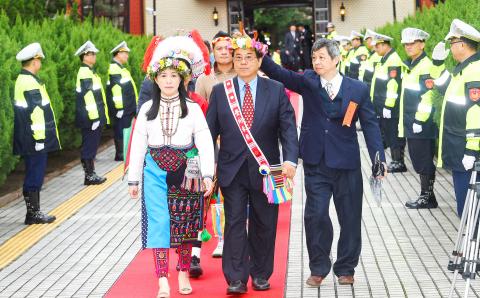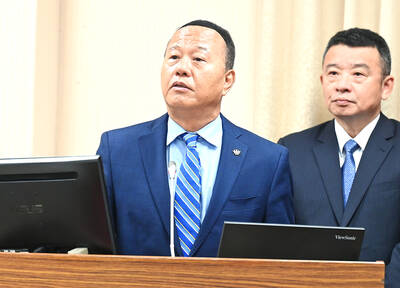The first session of the ninth legislature convened yesterday, with 113 newly elected and re-elected lawmakers reporting for duty at the Legislative Yuan.
Many legislators waited at the Legislative Yuan’s front door before it opened at 8am to be the first to report for work, including Democratic Progressive Party (DPP) legislators Huang Wei-cher (黃偉哲) and Chen Ou-po (陳歐珀).
First to arrive was DPP Legislator Cheng Yun-peng (鄭運鵬), who entered the Legislative Yuan via a side door without walking the red carpet lined with police officers and reporters.

Photo: Chang Chia-ming, Taipei Times
Cheng said he had not intended to be the first legislator to report for duty.
Some New Power Party (NPP) legislators attracted attention because of their involvement in the 2014 Sunflower movement, which saw protesters occupy the Legislative Yuan’s main chamber in protest against the government’s handling of a cross-strait service trade agreement.
“In 2014, there were many friends who charged into this building because something happened inside that broke the hearts of Taiwanese. After two years, we are back again, entrusted with a commission to change this place and ensure that nothing similar happens ever again,” said NPP executive chairman Huang Kuo-chang (黃國昌), referring to the controversial passage of service trade pacts through the Legislative Yuan’s Home Affairs Committee.
Huang walked the carpet with his wife and daughter and was welcomed by the police.
NPP legislators Hsu Yung-ming (徐永明), Kawlo Iyun Pacidal and Hung Tzu-yung (洪慈庸) appeared with their families, with Hung saying: “Legislative reform and transparency are our top priorities.”
NPP Legislator Freddy Lim (林昶佐) was accompanied by his assistant, Sunflower movement activist Wu Cheng (吳崢).
DPP legislators Cheng Li-chun (鄭麗君), Chiu Yi-ying (邱議瑩) and Hsiao Bi-khim (蕭美琴), collectively nicknamed “the SHE of the DPP” by Internet users after the pop girl band, made an appearance together.
Hsiao said she was extremely grateful for being able to return to the Legislative Yuan, “especially in the capacity of Hualien representative,” as she competed in a difficult electoral district in the Jan. 16 legislative elections.
DPP Legislator Tsai Yi-yu (蔡易餘) walked the carpet with his mother and grandmother, saying he wore a newly made suit to welcome a new job, while DPP Legislator Karen Yu (余宛如) arrived with her baby.
Chinese Nationalist Party (KMT) Legislator Wang Jin-pyng (王金平) said his mood remained the same, despite having stepped down from the post of legislative speaker, which he had filled for 17 years, adding that he would make a different contribution in his new role.
KMT Legislator Chen Chao-ming (陳超明) arrived with his centenarian mother, saying he was thankful for his mother’s support during his decades-long political career.
Accompanied by his parents, KMT Legislator Apollo Chen (陳學聖) said that although the KMT secured only 35 seats in the legislature, the party would still exercise its remaining influence to protect the public.
KMT Legislator Ko Chih-en (柯志恩) showed up with her former students from Tamkang University, saying that young people’s support is what the KMT needs most, while KMT Legislator Chiang Wan-an (蔣萬安) arrived with his wife and son.
KMT Legislator Hsu Chen-wei (徐榛蔚) walked the carpet with her ex-husband, Hualien County Commissioner Fu Kun-chi (傅崑萁), with Fu saying he was glad to visit the Legislative Yuan as a retired lawmaker and a family member of a new legislator, adding that Hsu Chen-wei would outperform him.
Additional reporting by Abraham Gerber and Chang Hsiao-ti

VIGILANCE: The military is paying close attention to actions that might damage peace and stability in the region, the deputy minister of national defense said The People’s Republic of China (PRC) might consider initiating a hack on Taiwanese networks on May 20, the day of the inauguration ceremony of president-elect William Lai (賴清德), sources familiar with cross-strait issues said. While US Secretary of State Anthony Blinken’s statement of the US expectation “that all sides will conduct themselves with restraint and prudence in the period ahead” would prevent military actions by China, Beijing could still try to sabotage Taiwan’s inauguration ceremony, the source said. China might gain access to the video screens outside of the Presidential Office Building and display embarrassing messages from Beijing, such as congratulating Lai

REPORT: Taipei has expressed an interest in obtaining loitering munitions matching the AeroVironment Switchblade 300 or the Anduril Altius-600, ‘Foreign Policy’ said Taiwan is seeking US-made kamikaze drones in an apparent concession to pressure from Washington to focus on asymmetric capabilities to defeat or deter a Chinese attack, Foreign Policy said in a report on Wednesday. Taipei has expressed an interest in obtaining AeroVironment Switchblade loitering munitions or other devices with similar capabilities, it said, citing four sources familiar with the matter commenting on condition of anonymity. The Switchblade 300 is a tube-launched drone designed for attacking ground troops, while its larger sibling, the Switchblade 600, could be used to destroy tanks and entrenched troops. Ukraine has utilized both systems extensively in its fight against

Police officers yesterday morning apprehended the prime suspect of a triple homicide case, after raiding the suspect’s hideout in Taichung. They transported the suspect to New Taipei City for questioning and recorded his statement last night. The suspect, identified as a 24-year-old man surnamed Chang (張), is believed to have used his hands to strangle his wife, surnamed Chen (陳), 29, along with his three-year-old son from a previous marriage and his wife’s mother, 69. The three dead bodies were wrapped in blankets when they were discovered inside their apartment in New Taipei City’s Sanchong District (三重) on Saturday. Chang was holding a

Hungarian Member of Parliament Tompos Marton said he considers Taiwan to be a better alternative to China as a strategic partner. Marton, who is the vice president of the opposition Momentum Party, made the remarks in an interview with the Central News Agency on Sunday. He draped a Republic of China flag across his shoulders to protest Chinese President Xi Jinping’s (習近平) visit to the capital city, Budapest, on Thursday last week, and openly voiced support for Taiwan on social media. He said in the interview that he wanted to remind the world that there were alternatives to China, and that “Taiwan has